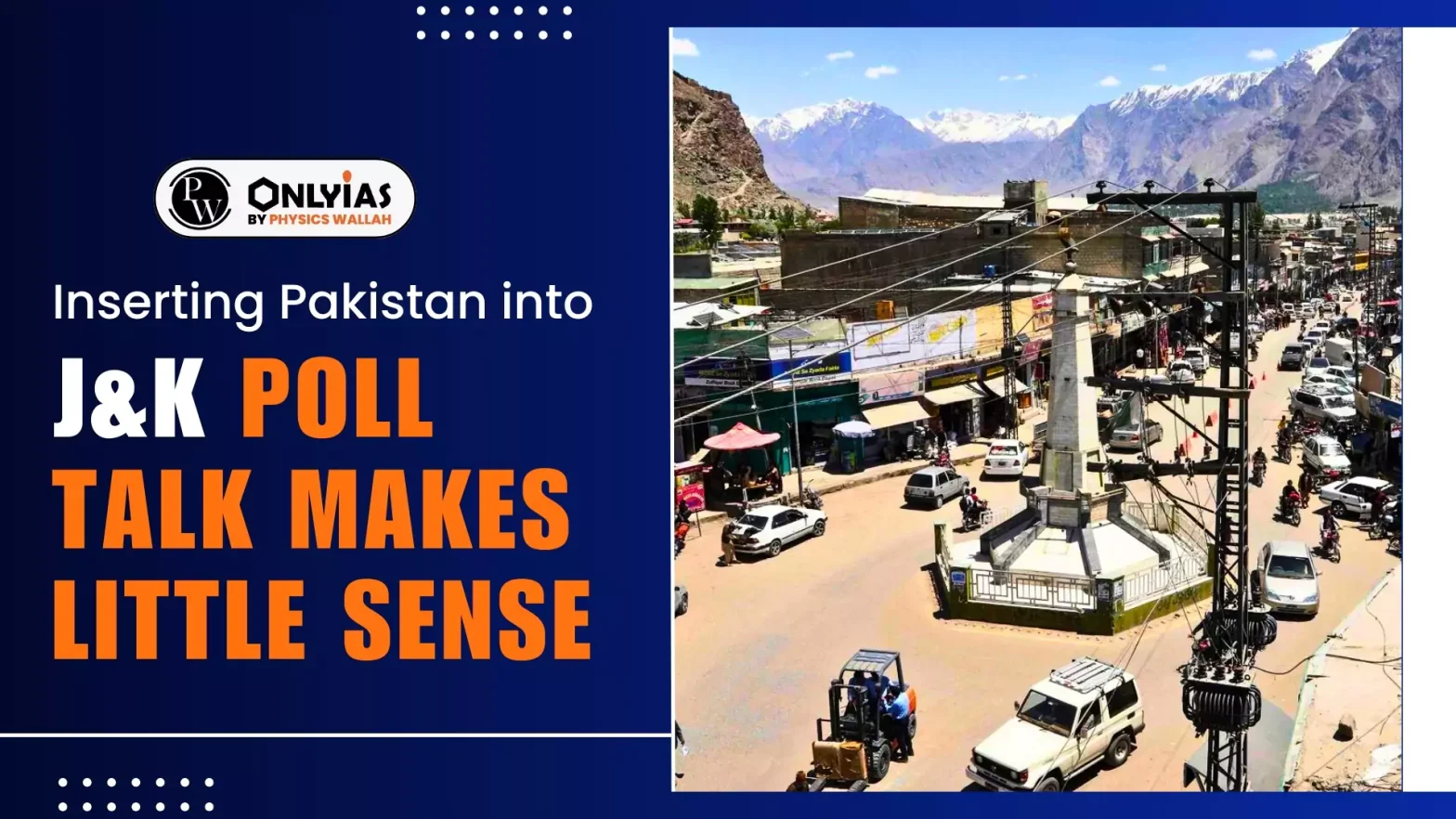The upcoming assembly elections in Jammu and Kashmir (J&K) are significant as they will be the first since the 2019 abrogation of Article 370, which restructured J&K into two Union Territories: Jammu and Kashmir, and Ladakh. This change ended J&K’s special status and brought it under direct central government control. The elections follow a high voter turnout of 58.6% in the recent Lok Sabha elections, indicating increased political engagement. Regional parties such as PDP and National Conference are advocating for the restoration of Article 370, the re-establishment of statehood, and renewed dialogue with Pakistan. These demands, however, must be scrutinised in the context of Pakistan’s own governance of regions such as Pakistan-occupied Kashmir (POK) and Gilgit-Baltistan (G-B), where administrative control and democratic freedoms are notably restricted.
Historical Context and Administrative Control
- Karachi Agreement: After the 1948 war and the establishment of the status quo, the northern areas, which constitute 85% of Pakistan-occupied Kashmir (POK), were placed under direct administrative control by Pakistan and renamed Gilgit-Baltistan. The remaining area was designated “Azad Kashmir” under the Karachi Agreement of 1949, signed between the Muslim Conference and the Pakistan government.
- Violation of UN Resolutions: The Karachi Agreement was kept secret for decades, revealing Pakistan’s strategic manipulation of the territorial status quo without conducting a plebiscite, thereby violating UN Security Council resolutions. The POK High Court acknowledged this breach in 1993.
- Judicial Recommendations and Overturning of Verdict: The POK High Court recommended restoring autonomy to POK and ending direct control by Pakistan. However, this verdict was overturned by the POK Supreme Court, which ruled that the POK High Court lacked jurisdiction over the matter.
- Comparative Analysis: This situation highlights that while India faces criticism for reorganizing Jammu and Kashmir, Pakistan had already divided the region in 1948 under the Karachi Agreement.
Enroll now for UPSC Online Course
Governance and Autonomy Issues in Occupied Areas
- Centralised in Pakistan-Occupied Kashmir: India adopted universal franchise at independence, but Pakistan-occupied Kashmir (POK) held its first election based on this principle only in 1970. POK received its Interim Constitution in 1974, establishing a governance structure where substantial powers were vested in the Kashmir Council, led by Pakistan’s Prime Minister, while the elected assembly had limited authority. This system, criticized as “rule by proxy,” persisted until 2018. The 13th amendment to the POK Constitution reduced the Kashmir Council to an advisory role without transferring its powers to the elected assembly, leaving the Pakistani government with direct legislative and executive control over 32 subjects within POK.
- Control and Autonomy in Gilgit-Baltistan (G-B): Gilgit-Baltistan (G-B), strategically important for its location at the Indus River’s entrance into India and its role in the China-Pakistan Economic Corridor (CPEC), has faced similar issues of control. Despite initial reforms under the Asif Ali Zardari government in 2009, the G-B Order of 2018 centralized legislative and administrative powers in the Prime Minister of Pakistan. This move was protested by the G-B Assembly and ultimately overturned by the G-B Supreme Appellate Court, but the Pakistani Supreme Court restored the 2018 order in 2019. The decision led to widespread protests and underscored the region’s persistent lack of autonomy.
- Electoral Manipulation in POK and G-B: Elections in POK and G-B increasingly serve as a façade for democratic governance, with the ruling party in Islamabad ensuring its local chapters win elections and marginalizing regional parties. For instance, the Muslim Conference, once a prominent party advocating for J&K’s accession to Pakistan, now holds only a single seat in the POK assembly. In G-B, local governance has been systematically dismantled, with central authority absorbing more powers and reducing local representation.
- Lack of Local Autonomy and Economic Exploitation: Both POK and G-B experience stricter control than Pakistan’s own provinces, with local populations having minimal influence over decisions. Projects like the Mangla Dam and Karakoram Highway were undertaken without local input, and there is inadequate protection of land rights. Unlike in Indian Jammu and Kashmir, where property ownership by outsiders is restricted, locals in POK and G-B face limited protections, leading to demographic shifts and a decline in the local population.
- Impact of Chinese Influence: The growing presence of Chinese companies in the region has led to significant economic exploitation. Projects such as the Diamer-Bhasha hydropower plant, despite ecological concerns exacerbated by the 2022 floods, prioritize “national interests” over local welfare. While these projects benefit Pakistan, G-B remains disconnected from national developments and receives minimal local benefits.
| Note: Pakistan’s situation is already precarious, with numerous internal issues, including economic difficulties and ongoing disputes with its neighbours. The country’s inability to address these challenges effectively and its problematic track record as a neighbouring country, undermine its credibility as a mediator in India’s electoral matters. This suggests that Pakistan’s involvement in discussions about Jammu and Kashmir’s future is questionable, given its own domestic struggles and strained international relations. |
Conclusion
The demand to reintegrate Pakistan into the dialogue on Jammu and Kashmir’s future appears increasingly disconnected from the realities of governance and human rights in POK and G-B. Pakistan’s administration in these regions is characterised by heavy-handed control, suppression of local autonomy, and economic exploitation, which starkly contrasts with democratic governance ideals. As Jammu and Kashmir embarks on a new political chapter, it is crucial to focus on enhancing internal democratic processes and addressing local aspirations within the framework of the Indian Constitution. This approach ensures that progress made since the abrogation of Article 370 is not undermined by regressive political narratives or external influences.
Check Out UPSC CSE Books From PW Store
![]() 3 Sep 2024
3 Sep 2024

